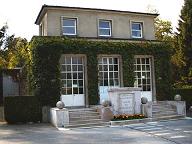[armistice day] november 11th, 1918, at 11 a.m.
 This building is but a memorial. The original train carriage has gone but the railway line can just be seen [lower right], leading to the building.
This building is but a memorial. The original train carriage has gone but the railway line can just be seen [lower right], leading to the building.Continued …
On November 8th, a German delegation met with Allied Supreme Commander Ferdinand Foch - who was to lead the military negotiations - in the forest of Compiegne, some 65 km north-east of Paris. The armistice was formally signed in Foch's railway carriage on 11 November, 1918, at 5 a.m. and came into effect six hours later at 11 a.m. [hence the 'eleventh hour of the eleventh day of the eleventh month'].
The armistice initially ran for 30 days but was regularly renewed until the formal peace treaty was signed at Versailles the following year. Should the Germans have deviated in any way from the terms of the armistice, the Allies would have commenced hostilities again within 48 hours.
The French saw the terms of the Armistice and the Versailles Peace Treaty that followed in 1919 as too soft and tried to dispossess Germany. The Germans saw the terms as ‘vindictive’ and ‘humiliating’ and as you know, in 1940 Hitler exacted the German revenge by forcing the French to sign an armistice - on German terms - in that exact same railway carriage.
Remembrance Sunday and Veterans Day are held on the Sunday but in some countries, the service is still held on the correct day, November 11th. This blog remembers the fallen on the proper day.
Poppies only flower in turned over soil. Their seeds can lie in the ground for years without germinating, and only grow after the ground has been disturbed. Dr. John McCrae, of the Canadian Armed Forces, was so deeply moved by what he saw in northern France that in 1915, in his pocket book, he scribbled down "In Flanders Fields".
“If ye break faith with us who die, we shall not sleep, though poppies grow in Flanders Fields.” The day before he wrote that, one of his closest friends was killed and wild poppies were already blooming between the graves where he was buried.
The first Poppy Day was held in Britain on November 11th, 1921, was a national success and so has continued every November since. The first Two Minutes Silence was held in London in 1919. The Manchester Guardian reported:
'The first stroke of eleven produced a magical effect. The tram cars glided into stillness, motors stopped dead, and the mighty horses hunched stopped also. Someone took off his hat, and the rest of the people bowed their heads also. An elderly woman, not far away, wiped her eyes, and the man beside her looked white and stern. Everyone stood very still ... The hush deepened. It had spread over the whole city. It was a silence which was almost pain ... and the spirit of memory brooded over it all.'
This two minutes silence still continues today and though not everyone stops, most do and it is still a very impressive sight. The 1915 poem by Laurence Binyon is still impressive: ‘At the going down of the sun and in the morning, we will remember them.’


<< Home